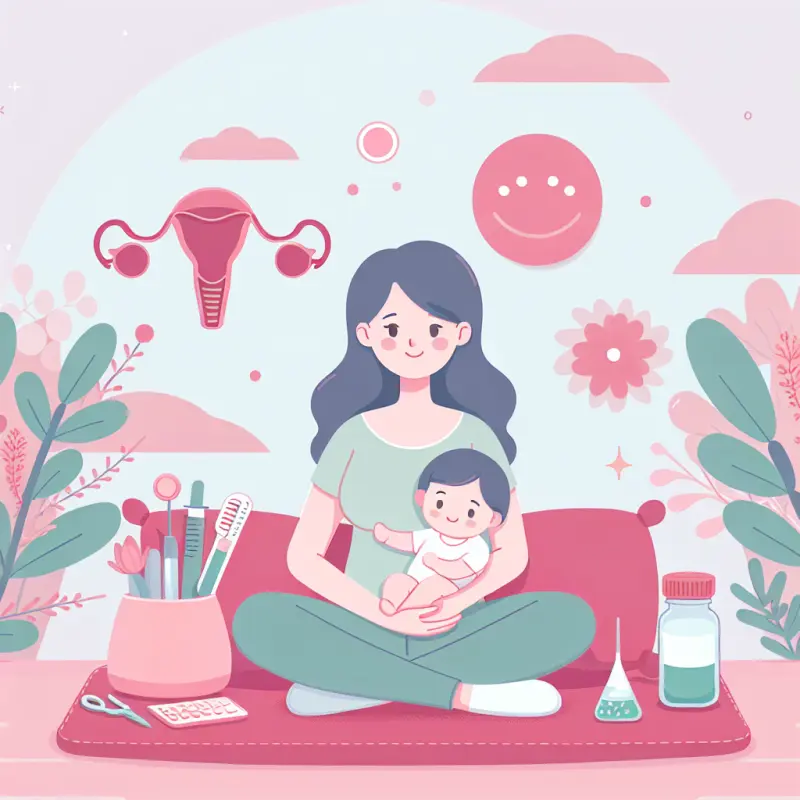Postpartum Depression and Menstrual Cycle Changes

Postpartum Depression and Menstrual Cycle Changes
Introduction
The journey of pregnancy and childbirth is a remarkable period in a woman's life, filled with significant physiological and emotional changes. While the birth of a child is a joyous occasion, it can also usher in challenges that can profoundly affect a woman's well-being. Two such challenges that often go hand-in-hand are postpartum depression (PPD) and menstrual cycle changes. Understanding the intricate relationship between these two phenomena is crucial for new mothers, healthcare providers, and society as a whole.
Postpartum depression is a complex mental health condition that affects approximately 1 in 7 women after childbirth. It can manifest in various ways, from mild mood swings to severe depressive episodes, and can significantly impact a mother's ability to care for herself and her newborn. Meanwhile, the menstrual cycle often undergoes significant changes after childbirth as the body adjusts hormonally and physically to the post-pregnancy state. These changes can include irregular cycles, heavier or lighter periods, and variations in cycle length.
In this article, we delve into the intricacies of postpartum depression and menstrual cycle changes, exploring how they are interrelated and what women can do to navigate these challenges. We will examine the causes, symptoms, and management strategies for both conditions, providing a comprehensive guide for new mothers and those who support them.
Understanding Postpartum Depression
What is Postpartum Depression?
Postpartum depression is a mood disorder that can affect women after childbirth. It is more severe and longer-lasting than the "baby blues," which many women experience in the first few days after delivery. PPD can emerge within the first few weeks postpartum, but it can also develop months later.
Symptoms of Postpartum Depression
PPD can manifest in various ways, including:
- Persistent sadness, anxiety, or "empty" mood
- Loss of interest or pleasure in activities
- Fatigue or loss of energy
- Changes in appetite or weight
- Sleep disturbances
- Feelings of worthlessness or guilt
- Difficulty concentrating or making decisions
- Thoughts of death or suicide
Causes of Postpartum Depression
The exact cause of PPD is unknown, but several factors may contribute:
- Hormonal Changes: The dramatic drop in estrogen and progesterone after childbirth can affect mood.
- Genetics: A family history of depression may increase the risk.
- Psychosocial Factors: Stressful life events, lack of support, and previous mental health issues can contribute.
- Physical Changes: Recovery from childbirth and sleep deprivation can exacerbate symptoms.
Menstrual Cycle Changes After Childbirth
The Return of Menstruation
Postpartum menstrual cycle changes are common as the body gradually returns to its pre-pregnancy state. The timeline for the return of menstruation can vary widely among women, influenced by factors such as breastfeeding and individual hormonal balances.
Breastfeeding and Menstrual Cycle
- Lactational Amenorrhea: Breastfeeding can delay the return of menstruation due to the production of prolactin, which suppresses ovulation.
- Mixed Feeding: Women who supplement breastfeeding with formula may experience an earlier return of menstruation.
Common Menstrual Changes
- Irregular Cycles: It is normal for cycles to be irregular initially as hormonal balance is restored.
- Heavier or Lighter Periods: Some women experience changes in flow, with periods being heavier or lighter than before pregnancy.
- Cycle Length Variations: The length of the menstrual cycle may change as the body adjusts.
Interrelationship Between Postpartum Depression and Menstrual Cycle Changes
Hormonal Influences
The hormonal fluctuations that occur postpartum can affect both mood and menstrual cycle regulation. Estrogen and progesterone levels, which drop significantly after childbirth, are implicated in both PPD and menstrual cycle changes.
Psychological Impact
The stress and emotional strain of dealing with menstrual irregularities can exacerbate feelings of anxiety and depression. Conversely, the emotional toll of PPD can make coping with physical changes more challenging.
Physical and Emotional Exhaustion
The physical demands of caring for a newborn, coupled with the lack of sleep, can lead to exhaustion, which may worsen both menstrual irregularities and depressive symptoms.
Managing Postpartum Depression and Menstrual Changes
Seeking Professional Help
- Therapy: Cognitive-behavioral therapy (CBT) and interpersonal therapy (IPT) are effective treatments for PPD.
- Medication: Antidepressants may be prescribed, considering breastfeeding compatibility.
- Support Groups: Joining a support group can provide a sense of community and understanding.
Self-Care Strategies
- Rest and Sleep: Prioritize rest, and seek help with nighttime feedings to ensure adequate sleep.
- Nutrition and Exercise: Maintain a balanced diet and engage in gentle exercise to boost mood and energy levels.
- Mindfulness and Relaxation: Practices such as yoga and meditation can help manage stress and promote emotional well-being.
Addressing Menstrual Cycle Changes
- Track Your Cycle: Use a menstrual tracking app to monitor changes and patterns.
- Consult Healthcare Providers: If menstrual changes are severe or persistent, consult a healthcare provider to rule out underlying conditions such as thyroid issues or polycystic ovary syndrome (PCOS).
Conclusion
The postpartum period is a time of significant transformation, both physically and emotionally. Understanding the relationship between postpartum depression and menstrual cycle changes is crucial for new mothers and those who care for them. By recognizing the symptoms, seeking appropriate support, and implementing self-care strategies, women can navigate these challenges more effectively.
Support from partners, family, and healthcare providers plays a pivotal role in ensuring new mothers have the resources they need to manage both postpartum depression and menstrual changes. By fostering a supportive and informed environment, we can help mothers thrive during this critical time, ensuring both their well-being and that of their families.
In summary, while postpartum depression and menstrual cycle changes pose unique challenges, they are manageable with the right support and strategies. Awareness and understanding can empower women to take charge of their health, promoting a smoother transition into motherhood.